From Syria to Sweden: Eiad´s perilous voyage across the Mediterranean
Eiad’s wife did not want him to embark on the perilous journey across the Mediterranean Sea to safety in Europe, but Eiad believed it was their only option. They had tried to build a new life in Egypt, but after two years in the country, Eiad realized he would not be able to provide a good future for his young children there. “Life wasn’t very good in Egypt”, he explains. In spite of his wife’s protests, Eiad decided to risk his life in a rickety boat sailing from Egypt to Italy. His wife and children returned to Damascus. “I was more worried about the kids”, he says. “I thought that if my life will finish, it will finish anyway – in Egypt, in the sea, wherever.”
After one and a half months of searching, he made contact with a human smuggler. The price for getting to Europe: 2,500 dollars. “We went in a group so it would be cheaper. The safest way to travel to Europe is through Turkey but it’s much more expensive. Sometimes, it can cost more than 8000 dollars per person” says Eiad. He describes the five-day boat journey to Italy with more than 300 others as “hell”- people were thrown into the boat and the smugglers did not care if they fell into the water. “If they had animals with them, they would take better care of them because they’re worth more to them”, says Eiad. Still, there was a sense of solidarity between passengers. Eiad recalls how two people almost fell off the boat in their sleep but were caught by the other passengers.
After reaching the shores of Italy, Eiad headed towards Northern Europe and arrived in Sweden on 12 October 2014. Coming here was a great relief, but life as a refugee has its daily struggles. “I miss my family” says Eiad, explaining how he had to adjust to his new life at the asylum-seeker reception centre in Farsta, Stockholm. “Starting over is not easy and leaving your country without your family… it’s hard. A lot of people who came here didn’t want to leave their lives behind in Syria. But it is impossible to give them back the same life here…They are forced to change” he says sadly.
For 36-year-old Eiad, a former shop and restaurant owner, living a slower paced life at the reception centre is a challenge. He often plays cards with some of the other people at the centre to make time pass faster and sometimes he also plays football. “But I have a problem with my back so I can’t do too much sport.” He believes life moves slower in Sweden. “In Syria, we do everything fast. A lot of Arabs find this very frustrating because we are always in a hurry” says Eiad with a laugh,
“We want things to happen faster, and we want to be reunited with our families sooner.”
Eiad says he has not started his life in Sweden yet, not without his family. “Your mind is not clear, it’s with your family, your kids, and you’re waiting to see them.” But despite the continuing concerns for his family, Eiad is hopeful for the future. “I want to finish my studies or work and study at the same time. I don’t like to sit still.” He hopes to use the skills he acquired as a restaurant owner in Syria to start a small restaurant in Sweden, serving Syrian food.
Eiad’s application for asylum has just been approved and he is waiting to be reunited with his wife and two sons, who are still in Syria. “My children are very excited about coming to Sweden”, says Eiad with a big smile. “My wife is worried because she doesn’t know anyone here and it’s strange for her. But I think she’s going to like it. She is an English teacher” he says proudly.
Page 13 of 33
-

UNHCR data visualization on Mediterranean crossings charts rising death toll and tragedy at sea
10.06.2022This is a summary of what was said by UNHCR spokesperson Shabia Mantoo – to whom quoted text may be attributed – at today’s press briefing at the Palais des Nations in Geneva.
-
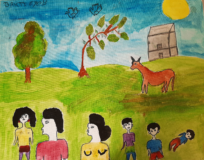
Art exhibition with children’s drawings show universal importance of family in Helsinki
02.06.2022What does family mean to you? UNHCR asked refugee children in countries such as Libya, Mozambique, Bangladesh and Ethiopia to draw their answers. The results will be on display at Redi Shopping Center in Helsinki in June.
-
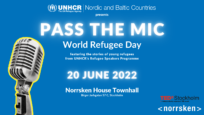
PASS THE MIC: World Refugee Day celebration in Stockholm
25.05.2022UNHCR is pleased to host a very special marking of World Refugee Day in Stockholm.
-

UNHCR: Ukraine, other conflicts push forcibly displaced total over 100 million for first time
23.05.2022Figure must ‘serve as a wake-up call’ for more action to promote peace and address all causes of forced displacement, says UN High Commissioner for Refugees, Filippo Grandi
-

Refugees in Iceland pursue education with help from student volunteers
18.05.2022The initiative Student Refugees is providing support and guidance to refugees and asylum-seekers in Iceland to overcome barriers in the education system.
-
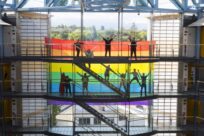
UN High Commissioner for Refugees Filippo Grandi’s message on the International Day Against Homophobia, Transphobia and Biphobia
17.05.2022Today is the International Day Against Homophobia, Transphobia and Biphobia (IDAHOTB). It is an important occasion on which to recognize people forced to flee a specific kind of persecution and discrimination – people on the run because of their sexual orientation, gender identity or expression, or sex characteristics. In too […]
-

Support from mentors help refugees in Latvia stand on their own feet
10.05.2022UNHCR’s partner ‘I Want to Help Refugees’ provides advise and support to help refugees navigate life in Latvia.
-
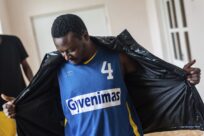
Two-year integration project kicks off across the Nordic and Baltic region
02.05.2022In May 2022, The Nordic Council of Ministers kicks off a comprehensive integration project in the Nordic and Baltic countries, supported by UNHCR.
-
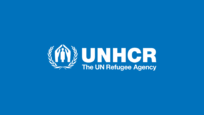
UN Refugee Agency appeals for urgent action amid soaring deaths at sea
02.05.2022This is a summary of what was said by UNHCR spokesperson Shabia Mantoo – to whom quoted text may be attributed – at the press briefing at the Palais des Nations in Geneva on 29 April.
-
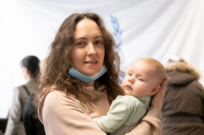
UNHCR and partners call for urgent support for refugees from Ukraine and their hosts
26.04.2022This is a summary of what was said by UNHCR spokesperson Shabia Mantoo – to whom quoted text may be attributed – at today’s press briefing at the Palais des Nations in Geneva.
